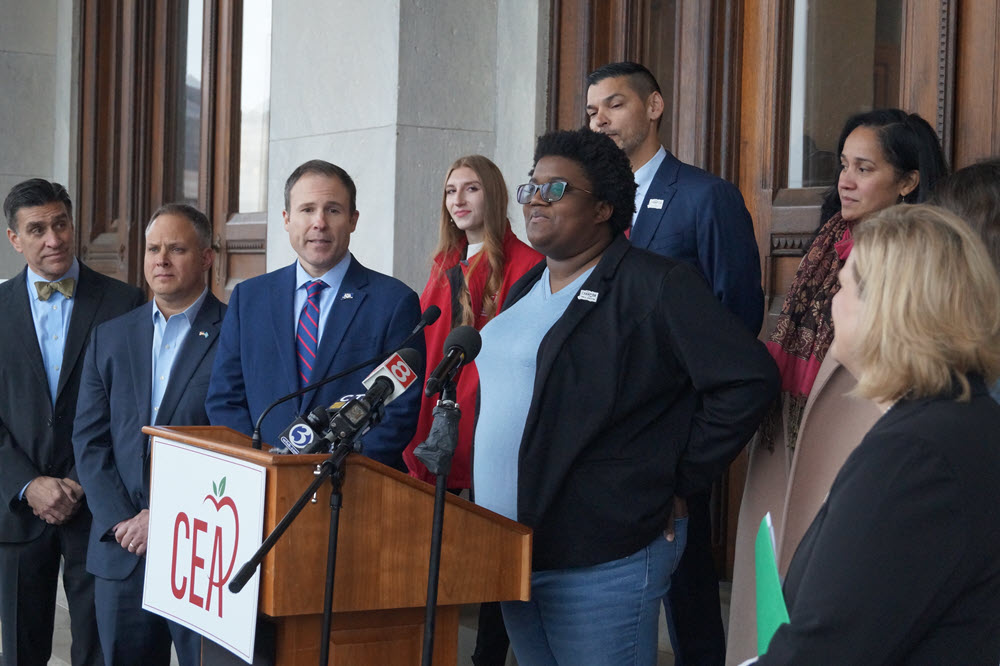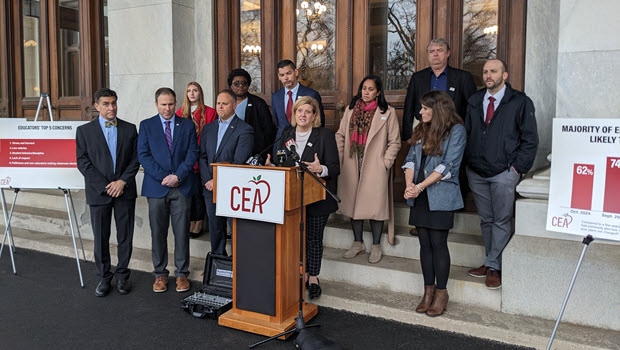“Educators are telling us that stress and burnout have leapfrogged to the top of the list of their concerns,” CEA President Kate Dias told reporters gathered today to hear about the findings from the latest CEA member survey.
“We have amazing things happening in our schools despite the underfunding and lack of resources, but imagine what could happen if we did right by the children of Connecticut,” she said. “Imagine if we could fully staff our schools because we paid our educators a decent competitive wage. Imagine all that Connecticut could be, what our economy would look like, imagine what our workforce would look like if we chose to make the critical investments that allow us to build up the state of Connecticut.”
The survey of over 5,000 CEA members statewide, conducted in October, shows that nearly all educators (98%) are concerned about frustration and burnout. When asked to select their five primary concerns, Connecticut teachers identified the following:
- Stress and burnout
- Low salaries
- Student discipline and behavior issues
- Lack of respect for the teaching profession
- Politicians making decisions that affect education
Teachers also named the top five issues contributing to stress and burnout:
- Challenges with student discipline/behavior
- Insufficient pay
- Lack of respect
- Politicians and non-educators making decisions that affect classroom learning
- Too many district initiatives
“Teacher burnout is real,” said State Rep. and CEA member Ron Napoli. “I had a family member who had taught for 20 years leave the profession that she loved and had put her heart and soul into because of burnout.”
While some teachers are heading out the door because of the conditions they face, others who have yet to fully enter the profession are wondering if they made the right career choice.
Aspiring educator Asya Kerr, a senior at Mitchell College, has an eight-year-old daughter and made the choice to go back to school to pursue a profession she loves. She’s currently student teaching in East Lyme.
“Being with my students is the highlight of every weekday for me, but student teaching is free labor. I go into that school and I have to put forth the same amount of effort as every other teacher in that building. I have to think about my students and what I’m teaching in the evenings and weekends and that’s coming at a cost to my family when I abandon them to prepare for my students.”

Aspiring educator Asya Kerr loves her work as a student teacher but struggles with the amount of time and effort required for an unpaid job that doesn’t allow her to support her family.
Even once she becomes a certified teacher, Kerr knows she will struggle to support her family. “Many teachers have to work extra jobs because we don’t have the salaries that allow us to take care of our families with the same security as other professionals who put in the same amount of schooling”
“Right now in Bridgeport we have a shortage of educators in critical areas including special education, math, science, and English for speakers of other languages. It’s having a negative impact on the students and on my colleagues as well,” Bridgeport Education Association President Jeff Morrissey told reporters.
“I am here asking for the state to accelerate its commitment to supporting our schools,” he continued. “A statewide minimum starting salary for certified educators and adequate funding for salary increases would be a critical first step. To provide for my family, I myself have worked on golf courses, bartended, tutored, and waited tables on nights and weekends. I can recall many Friday afternoons getting home from a full day of teaching only to have ten minutes to change into my restaurant blacks and jump back in the car so I would not be late for the dinner shift at whichever restaurant I was working in at the time. If we want the best and brightest educators, we must increase salaries.”
Aspiring educator Hannah Spinner, a UConn senior, said she’s already poured over various districts’ contracts, trying to figure out what her first-year teaching salary will be and whether she’ll be able to pay her bills without getting a second job or living with her parents.
“These concerns are hampering my passion for education and making me wonder whether this career will be sustainable. Education is underpaid and undervalued. What most teachers make 10 years into the profession with a master’s degree is what most of my peers I’m about to graduate with in May make in their first job with only a bachelor’s. While there’s nothing like seeing our students succeed, that kind of reward doesn’t pay off our student loans, cover our insurance bills, or put food on the table.”
“All of us here today really want a successful and thriving public school system where all of our students can learn well, joyfully, and with competent, caring, and smart educators at all levels to support them,” said CEA Vice President Joslyn DeLancey. “To achieve that, we have to make an investment in public education. It is the single most important investment we can make.”
“We stand ready to work with legislators on solutions to teacher burnout, stress, and low wages,” Dias said. “Together we can create conditions that not only encourage current educators to remain in the classroom but also inspire the next generation of students to see teaching as a fulfilling, rewarding, and viable career path.”
Watch the full CEA news conference to hear comments from other CEA members in attendance including Rep. Chris Poulos, Rep. Kevin Brown, East Hampton teacher Joe Holloway, Newington teacher Elsa Batista, and Manchester teacher James Tierinni.







